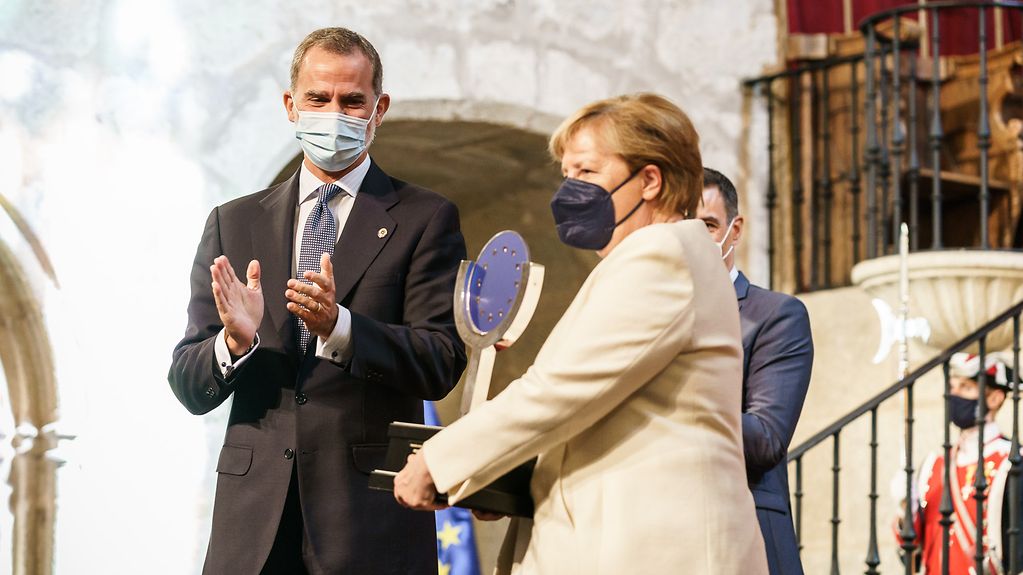Federal Chancellor awarded Charles V European Prize
Federal Chancellor Merkel was awarded this year’s Charles V European Prize by the King of Spain, Felipe VI. In her acceptance speech, she stressed that Europe must speak with a single voice; it must be confident, innovative and effective in order to be able to assert its values and interests in the world.
4 min reading time

Federal Chancellor Merkel received the prize for her contributions to European unity: “Europe is a godsend for us all.”
Photo: Federal Government/Denzel
Federal Chancellor Angela Merkel has received the Charles V European Prize for her tireless commitment to the European integration process. Participants at the grand ceremony in the Royal Yuste Monastery, around 230 kilometres west of Madrid, included the King of Spain, Felipe VI, Prime Minister Pedro Sánchez and the President of the Extremadura regional government, Guillermo Fernandez Vara.
Peace is not self-evident
Federal Chancellor Merkel began her acceptance speech by recalling the signing of the Treaties of Rome in 1957, which was when the objective of “Europe as a peace community” first took tangible form. But the Federal Chancellor warned that peace and freedom were anything but self-evident; they had to be protected and defended.
Merkel stressed that we should not delude ourselves: “Even today, we are repeatedly confronted with challenges to and attacks on our democracy and our liberal order” – such as by extremism and terrorism, racism and anti-Semitism, and these movements must be resolutely opposed.
“Inwardly united, outwardly strong”
Merkel regards the Nobel Peace Prize awarded to the European Union in 2012 as a permanent commitment to protect peace within Europe and to speak up for peace and human rights externally around the world.
In order for words to be followed by deeds, we must remember that “Europe can only be as strong as it is united, and can only be united to the extent that it sees itself as connected by common values,” the Federal Chancellor said. “Inwardly united, outwardly strong – that is our guiding principle for coexistence in the European Union,” she said. This required close cohesion as well as trust and respect.
Merkel pointed out how difficult it is to find compromises among 27 member states. “That’s why we must always be prepared to adopt and weigh up very different arguments – well aware that the diversity of knowledge and experience is a wealth, a valuable resource which should be used for the welfare of all.”
Coronavirus pandemic: together we have achieved a great deal
In this context, the Federal Chancellor addressed the coronavirus pandemic, saying that initially, the countries had concentrated too much on themselves and sought safety in isolation. However, the EU had learnt to deal with the new challenge. “We have established new coordination mechanisms and restored European freedoms as far as the pandemic situation allows,” Merkel said, and that a great deal had been achieved together. Infection protection meant that the economy was now improving again, as testified by the “European Next Generation EU recovery plan, which is unique in its dimensions.”
Thinking about economy and ecology together
The Federal Chancellor also mentioned the European Commission’s “Green Deal”. It stipulates climate neutrality for Europe, which “will remain innovative and competitive not despite this, but because of it.” Passing the Green Deal involved a lot of hard work, Merkel said. However, it was important to see the opportunities of this transformation process as well. “They far outweigh the risks, not just because new market opportunities, new technologies, new employment possibilities arise through this, but also because far too often, too much is said about the cost of climate protection and far too little about the cost of neglecting climate protection.”
Remaining in dialogue and stressing common values
Europe must be confident, innovative and capable of acting in order to be able to assert its values and interests in the world, Merkel stressed. To do so, Europe had to speak with a single voice. The consequences of failing to find a united voice can be seen in the issue of migration. “That’s why we cannot rest until we achieve a breakthrough here,” she demanded.
For some time now, centrifugal forces had been working in the European Union: common values were becoming fragile, expectations made of the institutions were not being fulfilled, resulting in social developments happening at different speeds. “If, in these cases, short or medium-term national interests are placed above the benefit of the common European project and the legal basis, this results in an imbalance,” Merkel said.
There was only one effective remedy against these centrifugal forces, she continued: remaining in honest dialogue with each other and stressing our common values. “Because they are our values, which connect us and also differentiate us from many other powers in the world.”
But the crises could also work as catalysts. Despite all the hardships, they also provided an opportunity for construction and improvement. After all: “Europe is a godsend for us all – a godsend which it is our privilege but also our duty to protect and shape.” All too often, acting along European lines meant great perseverance and mediation. “This is, and remains important,” she said.
The Charles V European Prize is awarded by the European and Ibero-American Academy of the Yuste Foundation for exceptional commitment to Europe. It has been awarding the prize since 1995. The award is presented by the King of Spain.